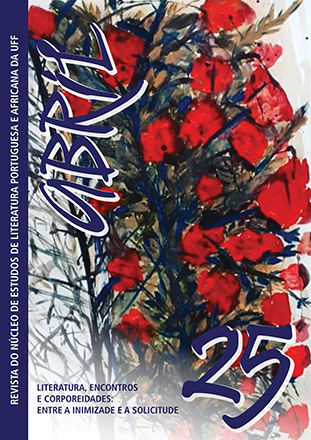Inimizades geopolíticas e pós-colonialismo no contexto do romance Neighbours, de Lília Momplé
DOI:
https://doi.org/10.22409/abriluff.v12i25.42925Palavras-chave:
Literatura Moçambicana, Políticas da Inimizade, Pós-Colonialismo.Resumo
Este ensaio propõe uma análise crítica do romance Neighbours (1995), da escritora moçambicana Lília Momplé, destacando as vizinhanças de inimizade entre Moçambique e África do Sul no período pós-independência como como mote central da narrativa e da mobilização de suas personagens. Assim, pretende-se observar como a animosidade entre os dois países desenha um quadro de instabilidade social no Moçambique pós-independência dos anos 1990, conformando uma série de violências que constituem o cotidiano moçambicano assustador, bem como outros conflitos de ordem geopolítica e social que se estabeleceram no pós-colonialismo. Para análise teórica dos aspectos destacados serão utilizados autores como Achille Mbembe (2017, 2018), Jéssica Falconi (2015, 2012), Anselmo Peres Alós (2011) e Ana Mafalda Leite (2004), dentre outros autores. Esses nos auxiliarão na discussão acerca do conceito de pós-colonialismo e na crítica ao painel violento de vizinhanças geopolíticas baseadas nas políticas de inimizade entre países fronteiriços envolvidos em intrincadas dinâmicas de circulação de sujeitos que culminam em acirrados conflitos em contextos pós-coloniais.
Downloads
Downloads
Publicado
Edição
Seção
Licença
Copyright (c) 2020 Abril – NEPA / UFF

Este trabalho está licenciado sob uma licença Creative Commons Attribution-NonCommercial 4.0 International License.
Autorizo a Revista Aabril - NEPA/UFF a publicar o artigo que ora submeto, de minha autoria/responsabilidade, caso seja aceito para publicação online. Declaro, ainda, que esta contribuição é original, que não está sendo submetida a outro editor para publicação, e assino a presente declaração como expressão da verdade.
Os trabalhos publicados no espaço virtual da Revista Abril serão automaticamente cedidos, ficando os seus direitos autorais reservados à Revista Abril. Sua reprodução, total ou parcial, é condicionada à citação dos autores e dos dados da publicação.

A Revista Abril utiliza uma Licença Creative Commons - Atribuição-NãoComercial 4.0 Internacional (CC BY-NC 4.0).









